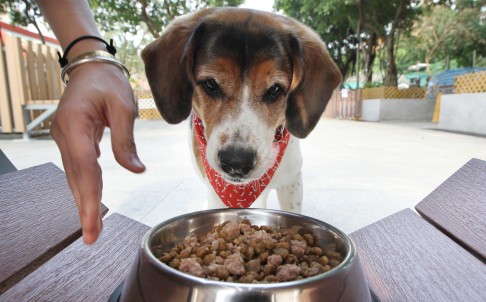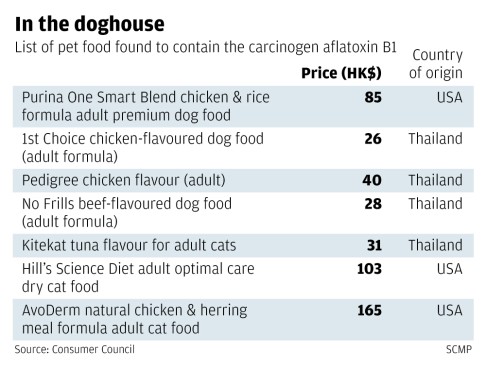Cancer-causing toxin found in Hong Kong pet food sparks alarm
Consumer Council calls for regulations on animal food after it finds carcinogen and other contaminants in one-fifth of products tested
PUBLISHED : Tuesday, 15 April, 2014, 1:44pm
UPDATED : Wednesday, 16 April, 2014, 12:14am
Amy Nip [email protected]

The biscuits that your pet dog loves could contain harmful substances. Photo: SCMP Pictures
A cancer-causing toxin has been found in seven types of pet food sold in Hong Kong.
The Consumer Council said its findings would cause concern among Hong Kong’s 286,300 pet-keeping households about the lack of laws regulating animal-food safety.
The council’s recent tests on 39 dry pet products – 20 dog foods and 19 cat foods – showed the amounts of aflatoxin B1 found in four dog foods and three cat foods ranged from one to two micrograms per kilogram. They include Purina One Smart Blend chicken and rice formula adult premium dog food, and Kitekat tuna flavour for adult cats.

There are no local laws that specify the level of carcinogens permitted in pet foods, but the level falls within the European Union regulations’ safety limits.
Vets told the council that short-term consumption was unlikely to cause a health risk, but long-term consumption could increase the risk of liver impairment, liver tumours and suppression of the immune system.
“Human beings eat a variety of food, and face lower health risks even if a particular food item is found to be problematic. Some pets, however, are fed only one type of dried pet food [and have higher risks],” Consumer Council chief executive Gilly Wong Fung-han said.
The tests also revealed two contaminants: melamine in Solid Gold adult dog food and Iams chicken cat food; and cyanuric acid in Purina Pro Plan salmon cat food and 1st Choice short-hair cat food. Vets said the detected levels did not cause health concerns, but that pet owners should not mix the brands as the contaminants were more toxic when combined.
According to a 2006 Census and Statistics Department survey, one in every eight Hong Kong households kept pets. Given this popularity, the government should assess the need for laws safeguarding animal food, Wong said.
One manufacturer of the pet foods found with aflatoxin B1, %Purina One, said the carcinogen was an “unavoidable natural contaminant” found in grains such as corn, barley and rice. %Another, AvoDerm, said it had since replaced the corn in its formula that was believed to be the source of the carcinogen.
Animal welfare groups supported legislation.
“Both pet food and human food goes into the stomach. Why is there no regulation for pet food?” Gloria Li Suk-fun, of Stop – Save HK’s Cats and Dogs, said.
Sally Andersen of Hong Kong Dog Rescue said many pet owners tried to save money by buying cheap dog food, but ended up paying more to the vets.
